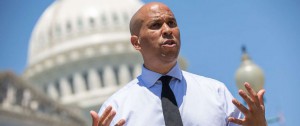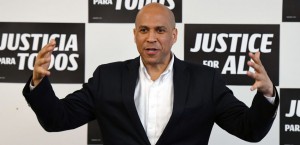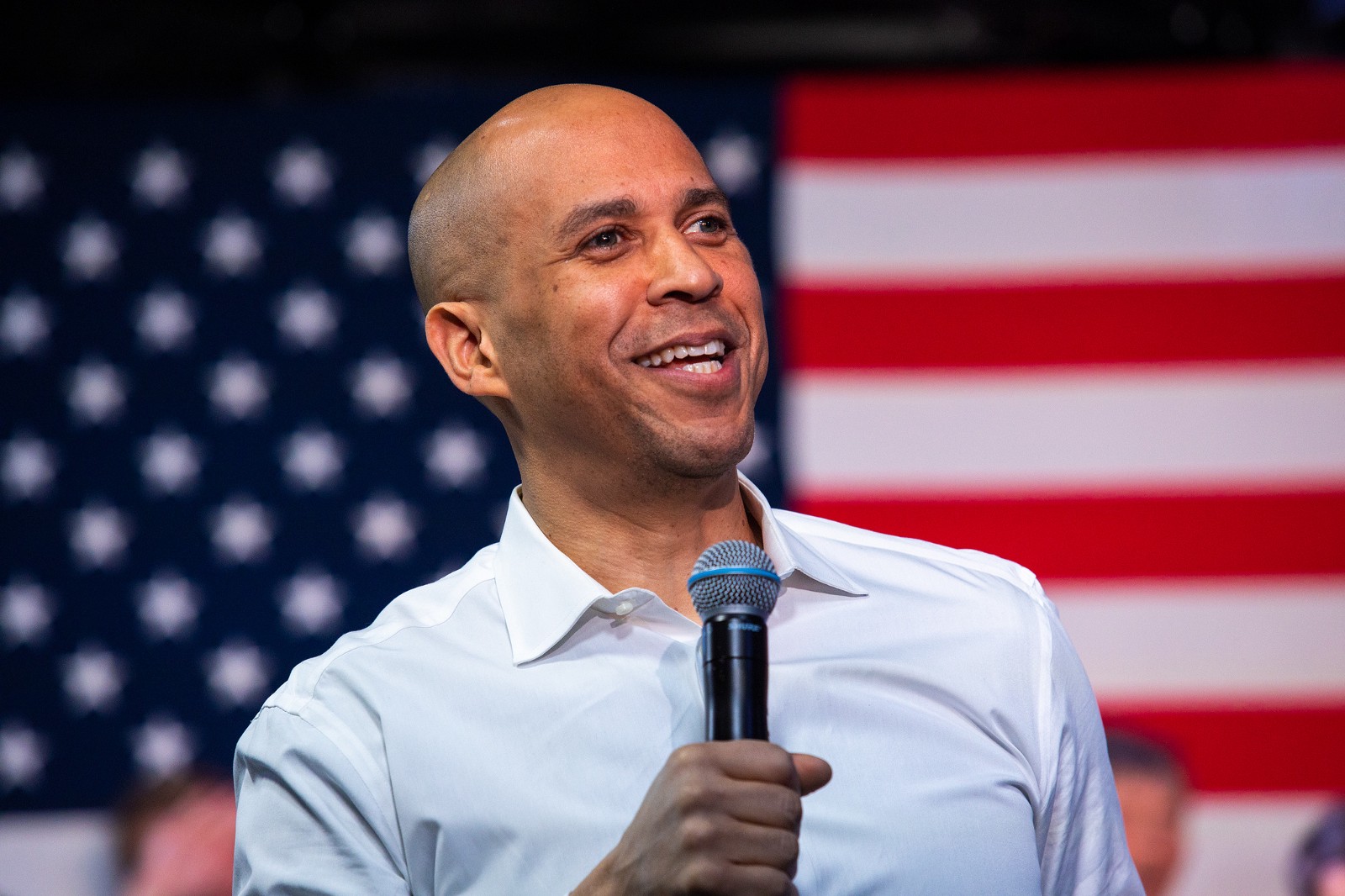Washington, D.C., May 7 – On the first day of African American history month, Sen. Cory Booker announced his campaign for President. Booker is the first African-American U.S. Senator from New Jersey and the 36th Mayor of Newark, but he is not the average politician. He is an Ivy League educated policy wonk and bachelor, who holds celebrity status for his social media presence and famous actress girlfriend, Rosario Dawson, best known for her part in the movie “Rent.” While voters find him charismatic and experienced, in a crowded field he has failed to perform that well in the polls.
If Booker hopes to improve his position in the polls, he must represent all Americans, including people with disabilities, who are politically active swing voters. People with disabilities comprise 25 percent of our country’s adult population, and more than half of all Americans have a loved one with a disability. A recent survey shows that fully three-quarters of likely voters either have a disability themselves or have a family member or a close friend with disabilities.
Ensuring Disability Inclusion Through Equal Access

For a presidential campaign to be fully inclusive of people with disabilities, it needs to meet the following requirements: (1) offer captioning with every video it shares or produces, (2) mention people with disabilities and their issues, (3) depict people with visible disabilities in its media, (4) reach out to the disability community, and (5) provide accessible campaign events and website.
Booker announced his presidential campaign with a colorful, creative and exciting announcement video on social media that incorporated a black marching band drum line. The video had fantastic and accurate open captioning that only failed to caption the upbeat drum line background music. However, he made no mention of people with disabilities nor depicted any Americans with visible disabilities. And the videos he has since released make these same mistakes, sometimes even failing to include captioning at all. Thus, he has missed the opportunity, thus far, to have a fully disability inclusive video campaign.
Further, his website says, “Cory is leading the fight for equal justice for all Americans.” However, while his website mentions and depicts diversity in race, gender and sexual orientation, it does not mention or depict people with disabilities once. True diversity exists only if people with disabilities are included, and a candidate cannot represent all Americans if he is excluding 20-25 percent of them.
Booker is Vague on Hiring Staff with Disabilities
In March of this year, Booker held a campaign event in Claremont, New Hampshire. During the question and answer portion of the event, a woman said to Booker, “My son has an invisible disability. In addition to survival with medication, a lot of people with disabilities struggle for inclusion.” And she reminded Booker of an earlier campaign promise to find out how many people with disabilities were on his staff and working for other senators.
Booker responded that he looked into it and said his office has “hired people with disabilities and will continue to do so.” His answer, however, failed to answer whether he currently employs people with disabilities or how his staff employment figures compare to his colleagues in the Senate.
The issue of hiring staff with disabilities on the campaign has been addressed by two other presidential candidates: Beto O’Rourke and Pete Buttigieg. Both candidates have promised to hire campaign staff with disabilities, and O’Rourke promised to hire them to positions of leadership on the campaign and, if he wins, in the Oval Office. Buttigieg already has followed through with his promise of hiring a person with a disability on his campaign staff. Kirsten Gillibrand has promised to have a person with a disability as a part of her cabinet. By comparison, Booker’s response was lukewarm. If he wishes to capture the disability vote, hiring members from within that community is essential, just as it is for any other minority.
Booker Fights to Improve Air Transportation for People with Disabilities

Though Booker’s campaign has not yet achieved full disability inclusion, Booker has a strong record of fighting for people with disabilities. People with disabilities have long experienced undue hardship when flying, including inaccessible planes and invasive security measures to mistreatment and repeated damage to their wheelchairs and medical equipment. A 2015 report to Congress found 27,556 accessibility-related complaints to the U.S. Department of Transportation filed by passengers in 2014, half of which pertained to failure to provide adequate assistance to those in wheelchairs. So in March of 2016, Booker urged the commerce committee to improve air transportation accessibility for people with disabilities. He said “Air travelers with disabilities continue to face extreme, unnecessary barriers that restrict them from participating in society on an equal basis.”
Booker was later successful in advocating for provisions that help improve accessibility in air travel when the Federal Aviation Administration (FAA) came up for reauthorization in the Senate. According to Booker’s press release, “the legislation instructs the U.S. Government Accountability Office (GAO) to conduct a study of airport accessibility best practices for individuals with disabilities, requiring the GAO to prepare a report for Congress on air carrier training policies related to assistance for persons with disabilities, and establish an advisory committee for the air travel needs of passengers with disabilities. Obtaining this data will help fuel effective policies that enhance the traveling experience for persons with disabilities, and remove barriers to access.”
Booker Fights for New Jerseyans with Disabilities to Live Independently
In September of 2014, Booker announced over $1M in federal grants to three housing developments in New Jersey to hire social workers and related staff to provide the elderly and persons with disabilities with supportive services necessary to independent living. “New Jersey must be a state that empowers all of its residents to thrive – especially the elderly and those with disabilities,” said Senator Booker. “This federal funding is critical to ensuring we are able to dedicate more resources and supportive services to meet their immediate needs.”
Booker’s Legislative History Is Strong on Disability
Though Booker is still a Junior Senator, he has introduced and cosponsored several bills related to disability, a few of which have been enacted, during his short time in Congress. Below is a non-inclusive list of some of this disability legislation:
- On December 18, 2018, Trump signed the Sickle Cell Disease and Other Heritable Blood Disorders Research, Surveillance, Prevention, and Treatment Act into law. Booker introduced the bill to the Senate in February of 2018. “Research and treatment efforts for sickle cell disease lags behind that of other chronic illnesses, even though it is the most common inherited blood disorder in our country,” Booker said. “This new law will improve the lives of people suffering from sickle cell disease, recognize the disease as a serious and debilitating illness, and allocate new resources to monitoring, researching, and treating it.”
- Booker cosponsored Comprehensive Justice and Mental Health Act of 2015, which was introduced by Sen. Al Franken (D-MN) and later enacted that year. The purpose of the law is to increase public safety by facilitating collaboration among the criminal justice, juvenile justice, veterans’ treatment services, mental health treatment, and substance abuse systems. It recognizes that 2,000,000 individuals with serious mental illnesses are booked into jails each year, most of whom also have physical disabilities and have high rates of recidivism.
- On July 26, 2017, Booker signed on to cosponsor the Disability Integration Act (DIA). The DIA, a bill introduced by Sen. Chuck Schumer (D-NY) and Rep. Jim Sensenbrenner (R-WI), would require private health insurance to cover long-term care, such as in-home nursing care and personal care attendants for people with disabilities. Many people with disabilities require assistance with activities of daily living such as showering, toileting and dressing. Long-term care coverage permits them to live independently in their own communities.
- In April of 2016, during National Reentry Week, Booker (D-N.J.) introduced the At-Risk Youth Medicaid Protection Act. According to the National Conference of State Legislatures, as many as 70 percent of children in the juvenile justice system have a mental disorder. The Act would prohibit states from terminating an eligible child’s Medicaid coverage, and instead require states to automatically restore a child’s enrollment in a medical assistance plan upon his or her release.
- On April 10, 2019, Booker introduced Medicare For All with Sen. Sanders (I-VT) to provide a single-payer healthcare system for all Americans. This revision of the bill provides vision, dental, hearing aid and long-term care coverage, which would greatly benefit people with disabilities. “Every single person deserves health care they can afford, and no one should go bankrupt or suffer from illness because the cost is too high,” Sen. Booker said.
- On February 27, 2019, Sheldon Whitehouse (D-RI) introduced the ALS Disability Insurance Access Act of 2019. The bill would amend Title II of the Social Security Act to eliminate the five-month waiting period for disability insurance benefits under such title for individuals with amyotrophic lateral sclerosis. Booker was one of the many bipartisan Senators to immediately cosponsor the bill.
For Booker to Lead the Fight for Equal Justice for All, He Must Lead the Fight on Disability Rights, Too

“Candidates for office ignore the disability community at their peril,” said former U.S. Representative and Dallas Mayor Steve Bartlett, who was a primary author of the Americans with Disabilities Act of 1990. Bartlett also serves as the chairman of RespectAbility. “People with disabilities are politically active swing voters, and candidates should take note of the important issues they care about.”
Sen. Booker wants to be president to lead the fight for equal justice for all. However, to do so, he must continue to fight for disability rights, campaign with disability in mind, and hire campaign staff with disabilities. When 20-25 percent of the population is ignored, justice for all is impossible.

Simply put: Booker is often far ahead of other politicians, including those in his party, when it comes to criminal justice reform. In the 2020 Democratic primary, it’s one issue that could make him stand out.
[…] Cory Booker […]